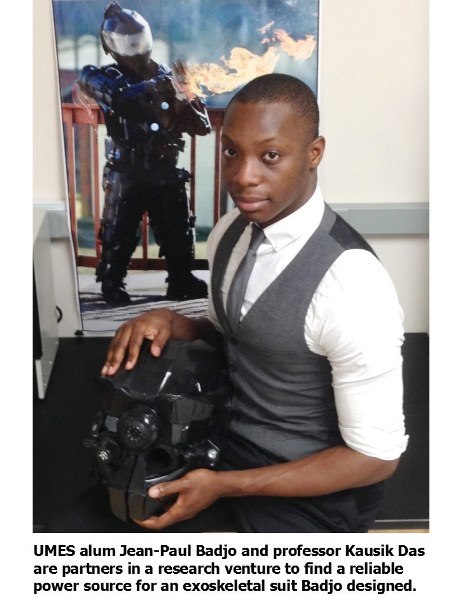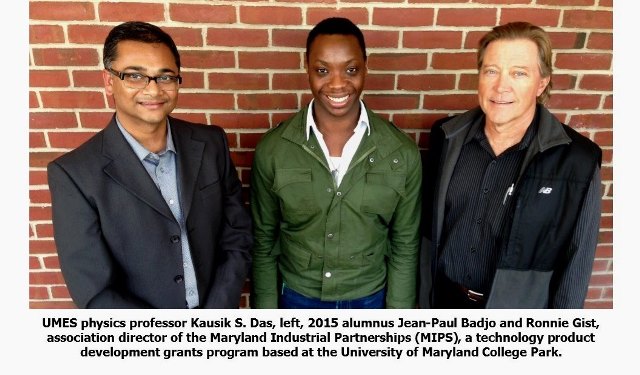
High-tech haberdashers
Friday, December 9, 2016
High-tech haberdashers
Friday, December 9, 2016
PRINCESS ANNE, MD – (Dec. 9, 2016) – A University of Maryland Eastern Shore professor and an upstart company founded by a 2015 alumnus have been awarded a $100,000 grant from the Maryland Industrial Partnerships (MIPS) Program to underwrite a technology-product development project involving bio-degradable batteries.
The MIPS funding will support a research partnership between Salisbury-based Badjo-T Industries LLC and Dr. Kausik S. Das to create a graphene-based supercapacitor both hope can power an exoskeletal suit designed by Jean-Paul Badjo when he was a UMES student.
MIPS jointly funds projects to support Maryland businesses that partner with University System of Maryland faculty in developing high-potential, technology-based commercial products.
Badjo’s fondness for video games and evolving technology as an adolescent inspired the so-called “Badjo Suit.” As an undergraduate, Badjo occasionally trotted out his suit from an obscure campus lab for demonstrations, including a stunt where one of the gloved hands doubled as a flame-thrower.
Badjo, who received a UMES degree in electrical engineering in December 2015, has single-mindedly pursued the design and development of a prototype he envisions someday could lead to versions that emergency first-responders, the military and the entertainment industry might use.
To power the many options Badjo wants to incorporating in his invention, he needs a reliable, lightweight power source.
Enter Das, an assistant physics professor whose interest in alternative energy sources brought the two together.
A graphene supercapacitor is flexible, can be created with a 3-D printer and “will be able to be used in future high-end uses for the exoskeleton,” according to the partners’ grant application.
“Supercapacitors are better at supplying large amounts of power in short bursts of time without losing energy,” the partners’ project abstract says.
Das said he’s driven to produce a battery that is “biodegradable, compact and wearable.”
Badjo secured $40,000 in seed funding over the past year to sustain his work on developing the suit through participation in the Shore Hatchery Entrepreneurship Competition sponsored by Salisbury University.
That success inspired Badjo and Das this past May to pursue support funding from MIPS, a program of the Maryland Technology Enterprise Institute (Mtech) in the A. James Clark School of Engineering at the University of Maryland, College Park.
To meet a MIPS’ grant requirement once it is approved, Badjo-T Industries contributed $10,000 to the project. Badjo is a graduate engineering student at the University of Maryland, Baltimore County.

For nearly three decades, MIPS has been working with entrepreneurs to provide “matching funds to help Maryland companies pay for the university research. Projects are initiated by the companies to meet their own research and development goals.”
For nearly three decades, MIPS has been working with entrepreneurs to provide “matching funds to help Maryland companies pay for the university research. Projects are initiated by the companies to meet their own research and development goals.”
“MIPS matching funds are awarded on a competitive basis for projects based on proposals submitted jointly by Maryland companies and researchers from any of the 13 University System institutions,” according to the program’s website.
For proprietary reasons, Das and Badjo cannot offer too much detail about their work. Badjo says he is working on version three of the self-named suit and is already thinking ahead to a fourth while Das focuses on battery options.
“We are all excited for this industry-academia partnership and creating some innovative intellectual properties to create jobs and growth,” Das said.
Working with Das, Badjo said, has “inspired me to pursue an keep up with new technologies.”

